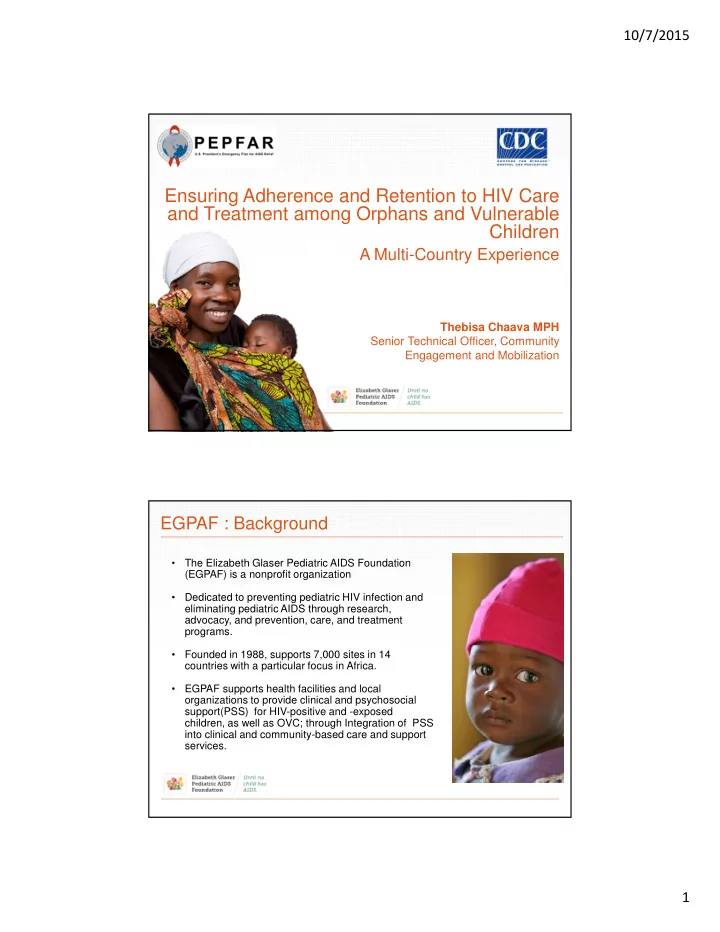

10/7/2015 Ensuring Adherence and Retention to HIV Care and Treatment among Orphans and Vulnerable Children A Multi-Country Experience Thebisa Chaava MPH Senior Technical Officer, Community Engagement and Mobilization EGPAF : Background • The Elizabeth Glaser Pediatric AIDS Foundation (EGPAF) is a nonprofit organization • Dedicated to preventing pediatric HIV infection and eliminating pediatric AIDS through research, advocacy, and prevention, care, and treatment programs. • Founded in 1988, supports 7,000 sites in 14 countries with a particular focus in Africa. • EGPAF supports health facilities and local organizations to provide clinical and psychosocial support(PSS) for HIV-positive and -exposed children, as well as OVC; through Integration of PSS into clinical and community-based care and support services. 1
10/7/2015 EGPAF OVC Interventions EGPAF country programs use one or a combination of the following child- centered approaches for the identification of OVC, testing and enrollment and retention in care: 1. Community counselor home visits/door-to-door screenings. 2. Community OVC and HIV testing campaigns. 3. Community-based psychosocial support groups. 4. Facility-based PSS groups for children 5. Facility PSS groups for children and their families. 6. Ariel Clubs for HIV-positive children . 7. OVC Caregiver training and socioeconomic support Ariel Clubs and OVC access to testing, treatment and retention in care In 12 countries, EGPAF uses Ariel Clubs to link vulnerable children to HIV counseling and testing (HTC) , treatment, and follow-up for retention in care by: • Facilitating disclosure of HIV-positive status by parents/caregivers to their children. • Helping children understand and accept their HIV positive status and how to live their life positively. • Building peer support for HIV-infected and affected children. • Linking children and their parents/caregivers to other support services, such as home care services, food support, income-generating activities, and legal services through resource mapping. 2
10/7/2015 Ariel Clubs: Key Programming Elements • Age-specific activities. • For children living with HIV. • Health facility-based. • Peer /caregiver facilitated and supported by health care workers. • Focus on disclosure and ART adherence. • Align with school programs for collection of ART collection and clinic visits. • Ariel camps during school holidays. Project Keneya EGPAF-Côte d’Ivoire 3
10/7/2015 Project Keneya: Background • Funded by PEPFAR through CDC, Project Keneya’s OVC model and interventions have proven effective in increasing testing, treatment, and adherence among children and youth. • Developed initiatives to promote HCT for OVC and enrollment of infected children into care. • Uses both facility- and community-based approaches to identify OVC • Community counsellors screen OVC during home visits, provide nutritional and economic well-being support and refer OVC to health facilities. • OVC who test positive are enrolled in care and OVC community-based PSS groups. Project Keneya: HIV Testing Approach among OVC • Brings HIV testing to beneficiaries/close to habitation. • Generates excitement for parents/OVC guardians for HIV testing through campaigns held in their communities. • Campaigns done in collaboration with community voluntary counseling and testing (VCT) centers or health facilities. • Systematically counseling of OVC parent/caregiver on HIV test by community counselors. • Provides family pre-test counseling, HIV test, and post-test counseling • Accompanying of infected children and parent by community counselors to health facilities for enrollment into pediatric care. 4
10/7/2015 Project Keneya: Adherence and Retention in Care • Tutorship and peer support group for HIV positive OVC • Monthly peer support group of 10-12 children to discuss adherence to treatment, self esteem, their future, etc. • Non-adherent children are visited by tutor (adherent adolescent or older children) to supervise drug taking and provide peer counseling. • Nutritional support and counselling Project Keneya: Results to Date From October 2014 to June 2015: • 20,832 OVC were served. • 13,929 children know their HIV status. • 4,488 children were tested and 75 (2%) were positive. • All 75 children referred to health facilities and enrolled in pediatric care. 5
10/7/2015 Project Umoja EGPAF-Kenya Project Umoja: EGPAF-Keneya’s OVC Model Funded by PEPFAR through CDC, Project Umoja uses a multi-pronged approach to support HIV testing and counseling, uptake, and linkages to care • Girls ART group therapy sessions to address social and academic challenges hindering school completion. • Caregiver monthly meetings. • Food distributions. • Caregiver trainings. • Evidence-informed behavioral interventions (EBI) classes for OVC . 6
10/7/2015 Project Umoja: Key Components EBI Classes for OVC • Healthy Choices for a Better Future: 54 Boys and 58 Girls enrolled. • Healthy Choices II: 18 Boys and 14 Girls enrolled. PSS Sessions Targeting Girls • 173 girls provided with group therapy sessions to address social and academic challenges. Project Umoja: Results of EGPAF-Kenya Model HTC Uptake Linkage to Care and ART 6,000 Currently 4,882 4,868 on ART, 5,000 Total 65% On CARE, 95% 4,000 Currently on ART, 3,000 2,414 2406 F 71% On CARE, 97% 2,000 2,468 Currently 2462 on ART, 1,000 M 58% On CARE, 50 118 68 92% 0 OVCs Known Total 0% 20% 40% 60% 80% 100% 120% supported status Positives M F Total OVC = 4,882; TARGET = 5,000 7
10/7/2015 Conclusion and Lessons learned • OVC platform is effective for increasing testing , ART adherence and retention • Multi-pronged comprehensive programs addressing multiple access and retention needs of OVC (community campaigns, door-to-door screening, accompaniment to health facility, and ongoing PSS group) • OVC and caregiver accompaniment to health facility by community. • Care givers and OVC needs trainings and ongoing PSS for motivation to test, treat and remain in care. • Within support groups sessions should be issue based and age specific. Merci, Asante Sana, Thank You 8
Recommend
More recommend